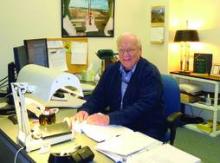Question: Looking back, what are some of the more rewarding things that have happened over the years in your career?
Dr. Baker: Overwhelmingly, No. 1 is the satisfaction of working with humans at whatever age, assisting them in their health care, and helping them to learn about themselves and their health issues and how to manage them. The second thing would be the period of practicing geriatrics for the frail elderly. I think the third significant concept of my practice life has been the joy of being a lifelong learner.
A Nonclinical Second Act: Dr. William D. Hakkarinen
Dr. William D. Hakkarinen was a 2nd-year family practice resident at Hershey Medical Center of Pennsylvania State University in 1971. Over the years, he has worked in rural and urban practices and served as director of the family practice residency at the Franklin Hospital Center in Baltimore. He is also a past president of the Maryland Academy of Family Medicine.
Starting in 2001, he switched to a nonclinical role, and currently works as a medical consultant in the Maryland Disability Determination Services, where he helps to review applicants for Social Security Disability.
Question: Did your family medicine training prepare you well, and were there any gaps that you noticed?
Dr. Hakkarinen: I wish I had had more ambulatory surgical training. There were surgical rotations, but I could have used even more. But that was then, and I think they have changed family practice residencies a lot since I went through. I could not say anything negative about family practice training. For me, it continues to be a wonderful career, and it was a great way to start.
Question: What were some of the biggest surprises for you in your family medicine clinical career?
Dr. Hakkarinen: From the clinical practice standpoint, I had no idea that psychiatric issues and depression were as common as they turned out to be. I think that’s well recognized now in residency programs, more so than when I first went through.
A sad surprise over time was how much of medicine became a business. I have to be frank. I was very naive as a resident. I looked at medicine as a calling, a profession – not a job. I was a residency director for 18 years, and my last year of residency directorship was in 2000. By then, the residents were talking about the jobs they were going to get after residency, rather than how to start their careers.
Question: Did you see interest in family medicine residencies decline?
Dr. Hakkarinen: As a residency director, we went from being at the peak of interest and being able to fill our residency slots three times over, to having to struggle and fight. That’s so sad, because the need is great – and the need is even greater as we talk about health care reform. It’s business. If you’re a medical student with $40,000, $60,000, $80,000, or $100,000 in debt, family practice incomes do not help you reduce your debt.
Question: Do you think the emphasis that’s being placed now on primary care through health reform will turn this around? Do policy makers need to address the financial pressures as well?
Dr. Hakkarinen: Oh, I think they need to do both. Yes, there has to be interest from health reform, but there has to be some way of coping with the cost.
One of the things that’s happening with health reform is that less-expensive ways of training to do primary care are becoming more evident. There are more people going into physician assistant programs and going into family nurse practitioner programs. It doesn’t cost as much to do that. I have been part of physician assistant and nurse practitioner training ever since the military. More and more, they are becoming not just physician adjuncts and expanders – they are becoming physician substitutes. I don’t know where it’s going to go, but if I were a young person today wanting to do primary care, I’d look long and hard at whether I want to spend what it takes to go to medical school.
Question: About 10 years ago, you left clinical practice for a nonclinical career as a medical consultant for the Maryland Disability Determination Services. Do you enjoy the work?
Dr. Hakkarinen: I absolutely love what I do. I come to work whistling, and I go home whistling. It’s a challenge; it’s satisfying; it’s helping people; it’s using the skills I learned as a family physician. This is an outstanding encore career.


